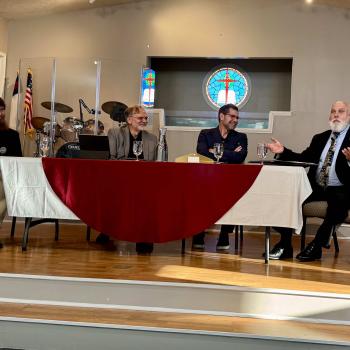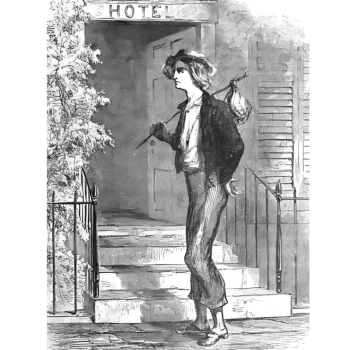The faith that there is one God who is sovereign over the whole universe entails a conviction that we are all participants in one world, despite our various understandings of it, and are all in relationship to one reality, whether we call it God or something else. Constructive moral discourse, therefore, is not a consequence of a common tradition but of a shared reality, which confronts us and all of our particular moral visions with its singular and unavoidable character. In fact, this reality destroys all our provincial loyalties and hopes (even Christian ones) and calls us to faithfulness to the reality toward which all these traditions and symbols point (in more and less adequate ways).
Radically monotheistic Christian faith, as Niebuhr describes it, contributes some important virtues to contemporary liberal democratic public discourse—virtues that have corollaries in other forms of radically monotheistic faith, whether they are religious or otherwise, whether they use the language of God or not. For example, a sense that God is truly sovereign leads to humility regarding the limitations of one's own viewpoint and a readiness to acknowledge that it might need to be reformed in order to conform more truthfully to God and God's ways. Similarly, acknowledging that God is the source of all truth produces a readiness to be open to new insights whatever their origin, including other religions, cultures, and political orientations. Finally, trusting God provokes the courage of one's convictions and the hope in God's good future required to participate fully and openly in a moral discourse the outcome of which one cannot completely control.
Greg: You write in the book about the distinction between the two primary perspectives in public life, Christian traditionalists and political liberals. How do you define these groups, and how does Richard Niebuhr offer a chance to move beyond them?
Tim: For the last couple of decades, two diametrically opposed views about religion in public life seem to have dominated both academic and popular discourse. On the one hand, many forms of contemporary liberalism seem committed to a secular public realm from which religious perspectives are excluded. They see religious voices as inherently destructive to public moral discourse because they represent the particular views of a segment of the citizenry, which are not accessible to the public at large. On the other hand, many contemporary Christians feel that their most fundamental convictions are at odds with the prevailing liberal democratic ethos of their society and therefore envision themselves as engaged in a fundamental struggle between the forces of light and the forces of darkness—to borrow a phrase from H. Richard's older brother. In my book, John Rawls represents the former, while Stanley Hauerwas represents the latter.
What H. Richard Niebuhr helps us see, I believe, is just how much these two opposed positions share in common. They both see religious faith and political liberalism as diametrically opposed—despite a much more complex historical interdependence. Moreover, they each go to great lengths to exclude anyone who does not share their particular perspective from participation in meaningful moral discourse. In effect, it is a culture war between two diametrically opposed moral visions and communities. H. Richard Niebuhr shows how each of these perspectives represents a henotheistic form of faith that demands absolute trust and loyalty to its own historically contingent tradition, practices, and community.
What is more, he shows how both liberal democracy and Christianity fall prey to inner contradictions when they descend into such limited loyalties and closed communities. Each in its own way depends on a more universal sensibility and inclusive loyalties. A form of liberal democracy that excludes certain perspectives and has its own survival as its highest goal ends up being illiberal and undemocratic. And a Christian church that sees itself as a righteous alternative to a fallen world beyond redemption is in danger of worshipping its own traditions, practices, and community rather than the universal God, who is the salvation of both the church and the world. H. Richard Niebuhr's theology, in other words, not only provides a model for constructive public discourse, but also helps show that both Christian churches and liberal democratic institutions require this sort of openness to a reality that transcends them both in order to become most truly what they are.
Greg: If Niebuhr were alive today, what do you imagine he'd have to say about our political life and the 2012 election? What would you most want to ask him?
Tim: In 1940, in an essay entitled "The Relation of Christianity and Democracy," H. Richard wrote, "We can be certain only that God will do his will despite us if not through us. We and our democracies may be broken if we fail in loyalty to his Kingdom. But his salvation will come nigh to those who seek neither Christianity nor democracy but his Kingdom and its righteousness." I think he might say something quite similar to us today. We are divided by fundamentally different moral visions, material interests, and religious orientations. What is more, we seem to spend all our time trying to defeat each other rather than to find common solutions to shared problems. This is a destructive situation in which there are unlikely to be any long-term winners, only losers. I imagine Niebuhr would ask us to look up from our fixation upon our own individual and group interests long enough to ask what God is trying to communicate to us through the circumstances we currently face domestically and internationally. And by asking such a question, we might have our eyes opened to a whole new way of seeing the world, and ourselves, and our relationships to one another.





